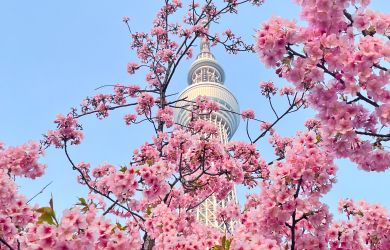
February 11, 2010
Feb 11, 2010
Originally published on metropolis.co.jp on February 2010 Lights Out In recognition of the fact that employees “feel uncomfortable about leaving the office when their colleagues are still working,” officials at Shiseido’s Ginza HQ have started turning off lights in their building at 10pm. Anyone still toiling away at that hour “must submit a written apology […]
By Metropolis
Originally published on metropolis.co.jp on February 2010
Lights Out
- In recognition of the fact that employees “feel uncomfortable about leaving the office when their colleagues are still working,” officials at Shiseido’s Ginza HQ have started turning off lights in their building at 10pm. Anyone still toiling away at that hour “must submit a written apology to their superiors, explaining the reason why they had to stay at the office until late.”
- The ticket reservation website of the Tokyo Metropolitan Art Space in Ikebukuro was shut down by the so-called Gumblar computer virus.
Toyama is set to become the first city in Japan to use an electric-powered bus on a regular route. The vehicle, manufactured by Hino Motors and operated by the Hokuriku Electric Power Co, produces just one-third of the CO2 of a standard diesel bus. - Waseda University was forced to cough up ¥90 million because wind turbines it helped install at 19 elementary and junior high schools in Ibaraki failed to generate the promised amount of electricity.
- 7-Eleven unveiled a store in Kyoto that has solar panels and a charger for electric vehicles.
Prime Minister Hatoyama withdrew his support of a proposed bill to videotape police interrogations, saying it “could be deemed as criticism of public prosecutors.” - The Agency for Cultural Affairs said it is interested in relaxing media rules pertaining to the principle of “fair use.” The move has been met with opposition by publishing industry groups, though Reg Dunlap gives it a big thumbs-up.
Law & order
- A 30-year-old Rwandan man who was stopped for an ID check by police in Nagoya was taken into custody for violating the immigration control law, even though he showed officers a copy of his receipt for his refugee status application.
- For the first time ever, a Japanese court acknowledged that smoking causes health problems.
- For the second time ever, the Supreme Court ruled that the government violated the constitutional separation of church and state. The current case had to do with a shrine using publically owned land in Sunagawa, Hokkaido.
- The Kochi District Court sent a letter of apology to a prospective lay juror for not providing an interpreter even though she is deaf. The woman wound up not being chosen to serve on the jury.
- The police department in Nihama, Ehime Prefecture, accidentally revealed the names of 29 underage shoplifters on its website. The names of the kids’ school districts were also disclosed.
Official business
- The city of Tono in Iwate Prefecture has issued credentials to 289 residents certifying them as folktale storytellers.
- A research team at Tokyo University found that gainfully employed people comprise the demographic that is “most active in seeking a life partner.”
-

Illustration by Enrique Balducci
It was reported that the tech-savvy monks at Jodo-Shinshu Honganji, Japan’s largest Buddhist sect, have set up a suicide prevention hotline.
- A neighborhood group in Akihabara coughed up ¥2.85 million to install 16 security cameras in an effort to promote the area “as a safe place that people can visit with a sense of security.”
- A survey revealed that 70 percent of Japanese smokers in their 20s are addicted to nicotine. The other 30 percent, apparently, just enjoy sucking on a burning tube of tobacco.
Coming & going
- The JNTO said that the number of foreign visitors to Japan plunged by 18.7 percent in 2009, “the sharpest decline since records were first kept in 1964.”
- Shinji Kazama, an adventurer who has bicycled across Australia and motorcycled to both the North and South poles, is organizing an ultra-marathon for disabled people. The Trans-Japan Ekiden follows a 2,230km route from Naha to Sapporo.
- US-based research firm Eurasia Group ranked DPJ bigwig Ichiro Ozawa third on its list of ten “up-and-coming leaders around the world.”
- The Japan Franchise Association announced that sales at convenience stores around the country rose 0.6 percent in 2009—the smallest increase in 11 years.
- Tokyo police said they plan to arrest 69-year-old photographer Kishin Shinoyama and two of his female models for indecent exposure. Shinoyama’s 2009 book, No Nude by Kishin 1 20XX Tokyo, shows the models engaging in lascivious acts in “cemeteries, wedding halls and on JR railway tracks.”
News from the animal kingdom
- Locals were astounded when the carcass of a Blainville’s beaked whale washed up on a beach in Kagoshima. The creature is more often found “in deep waters near the equator.”
- A Japanese macaque that escaped from Ueno Zoo by scaling a 4.5-meter concrete wall was captured six hours later in the basement of a nearby restaurant.
- Officials in Yamanashi Prefecture have established a “monkey dog” training course that teaches canines how to guard crop fields against simian invaders.
- Headline of the Week: Gang Leader’s Presence in Prime Sumo Seats Causes Stir (via The Mainichi Daily News)
- Runner-up: Brain Disorder Decides Flatfish Eye Migration (via The Daily Yomiuri)
And finally…
- It was reported that 30 percent of nursing homes in Tokyo employ foreign caregivers.
- The National Police Agency announced that bank transfer scams hit an all-time low last year, yet thieves still managed to swindle ¥9.58 billion.
- Japan and the UK agreed to set up a $500 million fund in Afghanistan that aims to “draw former Taliban insurgents back to civilian life.”
- A newly discovered trove of 39 photos dating from 1921 show Hiroshima’s Atomic Bomb Dome before it was destroyed in nuclear fire.
- About 2 million needles manufactured by Osaka-based Nipro Corp were recalled by the US Food and Drug Administration due to fears that they “could allow foreign silicone particles to enter a patient’s bloodstream.”
- It was reported that all over the country, scientists are impatiently waiting for some ¥6 billion in research funds approved by the LDP but stalled under the penny-pinching DPJ. Among the studies being delayed are iPS cell research and other “projects in which international competition is fierce.”
- A total of 32,753 people killed themselves in Japan in 2009, the fifth highest number on record.
Compiled from reports by the BBC, Japan Today, The Japan Times, International Herald Tribune/The Asahi Shimbun, The Mainichi Daily News, The Tokyo Reporter, The Daily Yomiuri, AP and Kyodo







